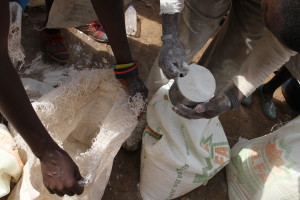Megan Brandsrud

Food distribution in a village in Cunene district.
Angola has been experiencing a prolonged dry spell since 2012, resulting in a food and water crisis. Agriculture is the primary source of income in Angola, and the drought has decreased the country’s agricultural production by more than 400,000 tons. Because of this, more than 365,000 households have faced a loss of income, food shortage and water shortage. During the past year, Lutheran Disaster Response has been working with Lutheran World Federation as we accompany people in Angola who have been impacted by the drought.
Even though the region has experienced some rains as the farming season comes to an end, food shortage is still a major issue. More than 12.5 tons of food items and non-food items are being transported for distribution in Cunene province.
Sanitation and hygiene conditions in the region have also been impacted by the drought. Hygiene kits have been distributed and spare parts are being used to rehabilitate 16 broken hand water pumps. In addition, 24 people, including health workers, local government representatives and church leaders, have been trained on hygiene and sanitation programs. The education that these people will be able to provide in the villages will help decrease health risks. Water and sanitation activities will also help curb and eliminate the risk of cholera, a waterborne illness.
Although rehabilitation work is being done, there is still much more to be done to help restore livelihoods and create sustainability. We as the church will continue to advocate for these vulnerable populations, and we ask you to join us in prayer for our brothers and sisters in Angola who are being impacted by this extended drought.
If you would like to support Lutheran Disaster Response’s work in Angola, please visit the Lutheran Disaster Response giving page.
